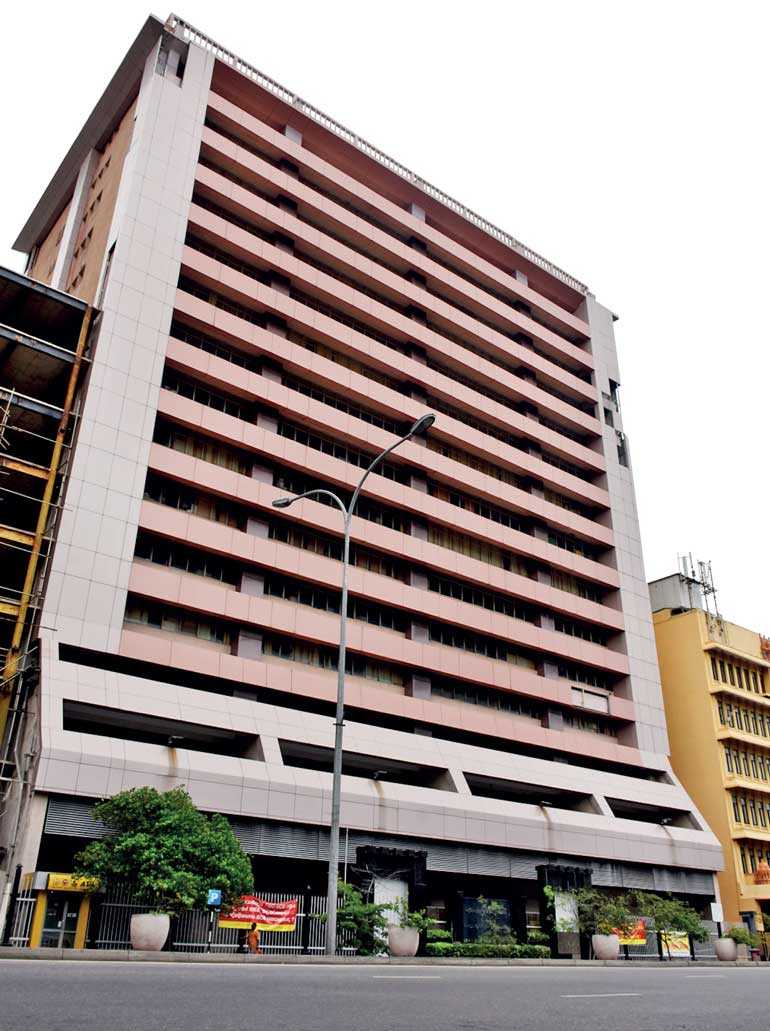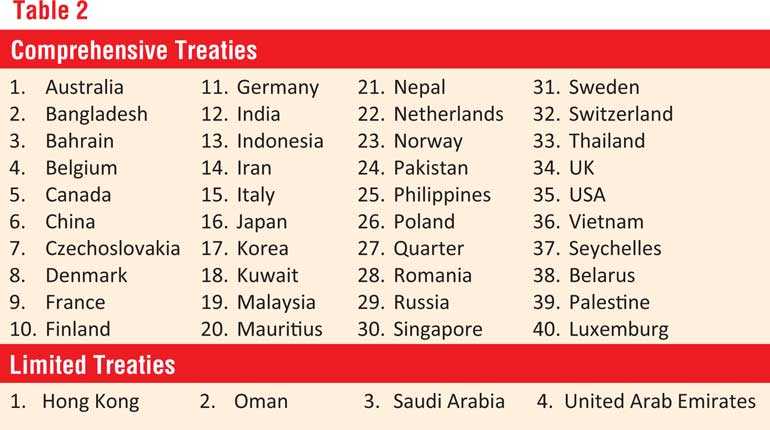Wednesday Feb 25, 2026
Wednesday Feb 25, 2026
Wednesday, 3 October 2018 00:00 - - {{hitsCtrl.values.hits}}


 7.What are Mutual Administrative Assistance Agreement (MAAAs)
7.What are Mutual Administrative Assistance Agreement (MAAAs)
The new IRA defines the “Mutual Administrative Assistance Agreement” to mean a tax information exchange agreement or other international agreement for mutual administrative assistance in relation to taxation matters.
Section 75 (5) of new IRA
“Mutual administrative assistance agreement” means a tax information exchange agreement or other international agreement for mutual administrative assistance in relation to taxation matters.
Globally, MAAA is in relation to tax matters or custom matters. The convention developed by the OECD and the Council of Europe identified as the “Convention on Mutual administrative assistance in tax matters” is a convention to facilitate the entering into Bi-Lateral tax information exchange agreements. The Common Reporting Standard (CRS) is an information standard for the automatic exchange of tax and financial information on a global level, developed in 2014 and its legal basis is the Convention on Mutual Administrative Assistance in Tax Matters”.
However, the Sri Lankan Government has not entered into a common reporting standard agreement, (Bi lateral tax information exchange agreement) with a single country to date, if concluded with another country would derive the force of law in Sri Lank a by virtue of Section 199(2) of new IRA.
8.MAAAs v DTAs
As mentioned earlier, MMAs have been defined at Section 199 of new IRA with reference to international agreements. The two definitions are as follows;
“‘mutual administrative assistance agreement’ means a tax information exchange agreement or other international agreement for mutual administrative assistance in relation to taxation matters.” [emphasis added]
“‘international agreement’ means an agreement between the Republic of Sri Lanka and a foreign government or governments;”.
Though MAAAs have been defined to encompass international agreements, such international agreements should essentially bear the character of “mutual administrative assistance in relation to tax matters” but would not extend to agreements for prevention of double taxation.
The contention, perhaps that may be adduced that aforesaid definition of MAAAs also encompass DTAs does not hold ground7 in the context of Section 75 (2) and Section 199 (3), which are reproduced below. The fact that two distinct Sections have been embedded in the new IRA to preserve the supremacy of DTAs & MAAAs over any other law in case of conflict, clears any doubt that, DTAs do not fall within the ambit MAAAs in the new IRA.
Section 75 (2) of new IRA
“Subject to the provision of subsection (3), where there is any conflict between the terms of a double taxation agreement having legal effect in Sri Lanka and the provisions of this Act, the double taxation agreement prevails.”
Section 199 (3) of new IRA
“If there is any conflict between the terms of a mutual administrative assistance agreement to which subsection (2) applies and any other law, the mutual administrative assistance agreement shall prevail.”
9.The Impact of the
Lacuna in the New IRA
The impact of the lacuna in the new IRA is twofold.
i. Any future Treaties for prevention of Double Taxation concluded with other countries and ratified by the Sri Lankan Parliament would not become part of the Sri Lankan domestic legal system, thus would not have the force of law in Sri Lanka. At present there are many Treaties for prevention of Double Taxation being negotiated with other countries A new treaty with Hungary and a revision of treaties with Switzerland, Finland, Oman etc. are under negotiations & consideration at present. Unless the lacuna in the new IRA is addressed, such treaties upon ratification by the Parliament would not derive force of law in the territory of Sri Lanka.
ii. The “Treaties for Prevention of Double Taxation” ratified by the Sri Lankan Parliament under the previous Inland Revenue Acts ceased to have force of law in Sri Lanka with effect from 1st April 2018. As of 31st March 2018, Sri Lanka had a network of 44 DTAs in force, both “Comprehensive Treaties” & “Limited Treaties”. (tabulated below)
9.1 Sri Lanka’s network of
double tax treaties
Comprehensive Treaties and Limited Treaties – see table 2.
9.2 Treaty benefits
The Comprehensive Treaties provide benefits such as exemptions, reduction of rates of taxation etc. to non-residents with regard to profits and income arising and deriving from Sri Lanka (under the new IRA income sourced from Sri Lanka). A Sri Lankan resident party is bound to adhere to the provisions in the Treaty by refraining from deduction of applicable withholding tax under the Inland Revenue Act or restricting the deduction to the rate specified in the Treaty. The Sri Lankan Inland Revenue Department is also bound to provide relief specified in the Treaty to a non-resident in a country where Sri Lanka has a legally enforceable Treaty.
However, with the 44 Treaties ceasing to have legal effect in Sri Lanka exemptions and reduction of rates specified in each Treaty strictly from a legal perspective would not command force of law in Sri Lanka. However, from a practical perspective as this lacuna in the law is not within the cognisance of persons who are making outbound payments as well as the officers of the Inland Revenue Department, the benefits contained in the Treaties would continue to applied in terms of applying the exemptions or reduction of the rates as specified in the treaties.
9.2.1 Dividends
As per the new IRA all dividends including outbound dividends and royalty payments made to non-residents outside Sri Lanka are also subject to 14% withholding tax.8 Most of the Treaties impose a lower ceiling on withholding tax on dividends and royalties. For an example, the treaty with India impose a maximum ceiling of 7.5% on dividends paid by Sri Lankan companies to Indian shareholders.
Article 10 (2) of the Indian Treaty
“2. However, such dividends may also be taxed in the Contracting State of which the company paying the dividends is a resident and according to the laws of that State, but if the beneficial owner of the dividends is a resident of the other Contracting State, the tax so charged shall not exceed 7.5 per cent of the gross amount of the dividends. …………...”
The readers may appreciate that the shareholders resident in India are not legally entitled for the lower rate of 7.5% due to the Lacuna in the new IRA.
9.2.2 Royalty
In case of royalty or fees for technical services the Treaty with India restricts the withholding tax on royalty or fees for technical services paid by a resident Sri Lankan to a recipient resident in India to a maximum of 10%.
Article 12 (2) of the Indian Treaty
“2. However, such royalties or fees for technical services may also be taxed in the Contracting State in which they arise, and according to the laws of that State, but if the beneficial owner of the royalties or fees for technical services is a resident of the other Contracting State the tax so charged shall not exceed 10 per cent of the gross amount of the royalties or fees for technical services.”
Due to the lacuna of the law in the new Inland Revenue Act, to provide legality to any Double tax treaty the provisions of the new IRA would be the strict applicable law. Hence, such dividends and royalties or fees for technical services paid to parties resident in India would be liable to withholding tax at the rate of 14% in case of both dividends and royalties according to strict legal interpretation of law.
9.2.3 Interest
The impact on outbound interest payments due to the lacuna of the law would be minimal as under the new IRA most of the outbound interest payments are exempt from withholding tax interest on Treasury bill and treasury bonds are free from withholding tax in the hands of both resident and non-resident recipients. Interest on foreign loans attract 5% withholding tax under the new IRA (unless it is taken on behalf of the Government of Sri Lanka). Article 11 of the Indian Treaty imposes a maximum ceiling of 10% whereas almost all the other Treaties also embed a maximum ceiling over and above the 5% withholding tax rate specified in the new IRA. In the context of the Treaty with India however, cross border loans granted by the Indian Government, a political sub division or a local authority in India, Reserve bank of India, the Export –Import Bank of India, the National Housing Bank would have an impact from a legal perspective as interest paid on such foreign loans would be exposed to 5% withholding tax under the new IRA though the treaty shelters such interest by providing a full exemption from tax.
Article 11 para (2) of the Indian Treaty
“2. However, such interest may also be taxed in the Contracting State in which it arises, and according to the laws of that State, but if the beneficial owner of the interest is a resident of the other Contracting State, the tax so charged shall not exceed 10 per cent of the gross amount of the interest.”
9.2.4 Impact on business profits derived by non-resident companies from Sri Lankan sources
As per Section 4 of the new IRA “The assessable income of a person for a year of assessment from employment, business, investment or other source shall be equal to –
(a) in the case of a resident person, the person’s income from employment, business, investment or other source for that year, wherever the source arises; and
(b) in the case of a non-resident person, the person’s income from the employment, business, investment or other source for that year, to the extent that the income arises in or is derived from a source in Sri Lanka”.
Income that has a “Source in Sri Lanka” has been defined in Section 72 of new IRA read in conjunction with Section 73 of new IRA.
A DTA played a major role in sheltering business profits derived by non-resident corporates from Sri Lanka due to the mandatory requirement for such profits to be liable for Sri Lankan income tax only in case such non-resident corporate carrying on business in Sri Lanka via a Permanent Establishment as defined generally in Article 5 of most of the DTAs. Paralysing of the existing Double Tax Treaty Network due to the oversight in drafting would have the greatest impact on business profits derived by non-resident corporates from Sri Lanka. This is due to the fact that, the business profits that were liable for income tax under the domestic Income Tax statutes were sheltered from Sri Lankan income tax in the absence of the Permanent Establishment. Such business profits would now be at the mercy of the tax gatherers as the tax man at the Sri Lanka Department of Inland Revenue, as such business profits would be liable under the new IRA.9 The shelter enjoyed by non-residents due to the inapplicability of the concept of Permanent Establishment embedded in the relevant Double Tax Treaty.
The impact of the lacuna in the new IRA is not restricted to dividends, royalty, interest but would extend to shipping and air transport, immovable property, dependent and independent personal services, artistes and sports persons, pension and annuities, students and professors etc derived by residents in other Treaty countries.
10. The manner of rectification
of the new IRA
Though the absence of the force of law for the DTAs ratified by the Parliament is not within the cognisance of the investors and other stakeholders including the officers of the Inland Revenue Department, hence, “business as usual” is the order of the day, it is pertinent that the policy makers may take appropriate measures to address the anomalous situation due to the risk of public interest litigation. Every citizen of Sri Lanka may have the locus standi to mount public interest litigation for providing tax reliefs by way of exemptions and reduction of income tax to non- residents under the DTAs which lacks force of law, hence in the ultimate analysis causing a detriment to public revenue.
Elimination of the lacuna requires two sections to be included in to the new IRA.
a. Firstly, to sanction the force of law for the DTAs upon being ratified by the Parliament. Eg: Section 97 (1)10 and 92(1) of the 2006 Act & 2000 Act respectively provided the force of law for DTAs ratified by the Parliament in the past. In the new IRA though Section 199 (2) provides legal effect to MAAAs that have been ratified by the Parliament, the Section does not provide force of law to DTAs. Section 199(2) of new IRA could be amended by including “Treaties for Prevention of Double Taxation” in addition to Mutual Administrative Assistance Agreements to have the force of law in Sri Lanka pursuant to ratification by the Parliament. This may also require inclusion of the reference to the DTA in the side note to Section 199 (2).
b. Secondly, an amendment to the transitional provision, Section 203 of the new IRA, to ensure DTAs that have been executed under previous Inland revenue Acts including Inland Revenue Act No. 4 of 1963, Inland Revenue Act No. 28 of 1979, Inland Revenue Act No. 38 of 2000 and Inland Revenue Act No. 10 of 2006.
The amendment introduced to transitional provision Section 203 has to be akin to Section 97 (3) and 92 (1) of Inland Revenue Act No. 10 of 2006 and 2000 Act respectively.
Section 97 (3) of Inland Revenue Act No.10 of 2006
“Every agreement entered into between the Government of Sri Lanka and the Government of any other territory and having the force of law in Sri Lanka by virtue of the provisions of section 70 of the Inland Revenue Act, No. 4 of 1963, or section 82 of Inland Revenue Act, No. 28 of 1979, or section 92 of the Inland Revenue Act, No. 38 of 2000, shall be deemed for all purposes to be an agreement approved by Parliament by resolution under subsection (1) of this section.”
[emphasis added]
[The writer, LLB, Attorney at Law, FCMA (UK), CGMA, is Chairman of the Tax Committee of the Bar Association of Sri Lanka.]
(Originally published in the Junior Bar Law Journal 2018 – Volume IX)
Footnotes
7 Therefore, the DTAs will have the force of law by virtue of Section 199 (2) of the new IRA.
8 Section 84(1) (a) of new IRA.
9 Section 62 (1) of Inland Revenue Act No. 24 of 2017, “non-resident person who carries on business in Sri Lanka through a Sri Lankan permanent establishment shall pay tax on the remitted profits earned within the year of assessment.
10 Cited earlier.